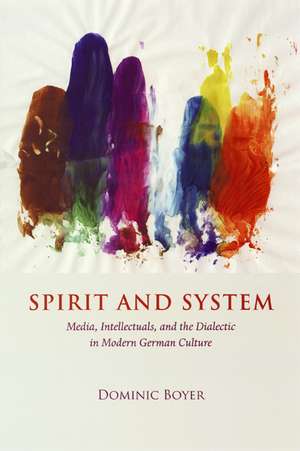Spirit and System: Media, Intellectuals, and the Dialectic in Modern German Culture
Autor Dominic Boyeren Limba Engleză Paperback – 10 noi 2005
Combining ethnography, history, and social theory, Dominic Boyer's Spirit and System exposes how the shifting fortunes and social perceptions of German intellectuals in the nineteenth and twentieth centuries influenced Germans' conceptions of modernity and national culture.
Boyer analyzes the creation and mediation of the social knowledge of "German-ness" from nineteenth-century university culture and its philosophies of history, to the media systems and redemptive public cultures of the Third Reich and the German Democratic Republic, to the present-day experiences of former East German journalists seeking to explain life in post-unification Germany. Throughout this study, Boyer reveals how dialectical knowledge of "German-ness"—that is, knowledge that emphasizes a cultural tension between an inner "spirit" and an external "system" of social life —is modeled unconsciously upon intellectuals' self-knowledge as it tracks their fluctuation between alienation and utopianism in their interpretations of nation and modernity.
Boyer analyzes the creation and mediation of the social knowledge of "German-ness" from nineteenth-century university culture and its philosophies of history, to the media systems and redemptive public cultures of the Third Reich and the German Democratic Republic, to the present-day experiences of former East German journalists seeking to explain life in post-unification Germany. Throughout this study, Boyer reveals how dialectical knowledge of "German-ness"—that is, knowledge that emphasizes a cultural tension between an inner "spirit" and an external "system" of social life —is modeled unconsciously upon intellectuals' self-knowledge as it tracks their fluctuation between alienation and utopianism in their interpretations of nation and modernity.
Preț: 177.00 lei
Preț vechi: 215.82 lei
-18% Nou
Puncte Express: 266
Preț estimativ în valută:
33.87€ • 35.23$ • 27.96£
33.87€ • 35.23$ • 27.96£
Carte indisponibilă temporar
Doresc să fiu notificat când acest titlu va fi disponibil:
Se trimite...
Preluare comenzi: 021 569.72.76
Specificații
ISBN-13: 9780226068916
ISBN-10: 0226068919
Pagini: 288
Ilustrații: 7 halftones
Dimensiuni: 152 x 229 x 20 mm
Greutate: 0.45 kg
Ediția:New.
Editura: University of Chicago Press
Colecția University of Chicago Press
ISBN-10: 0226068919
Pagini: 288
Ilustrații: 7 halftones
Dimensiuni: 152 x 229 x 20 mm
Greutate: 0.45 kg
Ediția:New.
Editura: University of Chicago Press
Colecția University of Chicago Press
Notă biografică
Dominic Boyer is assistant professor of anthropology at Cornell University.
Cuprins
Acknowledgments
Introduction
1. Conceptualizing the Formation of Dialectical Social Knowledge
2. The Bildungsbürgertum and the Dialectics of Germanness in the Long Nineteenth Century
3. Dialectical Politics of Cultural Redemption in the Third Reich and the GDR
4. Self, System, and Other in Eastern Germany after 1989
5. Dialectical Knowledges of the Contemporary: Formal and Informal
Conclusion
Key Terms
Bibliography
Index
Introduction
1. Conceptualizing the Formation of Dialectical Social Knowledge
2. The Bildungsbürgertum and the Dialectics of Germanness in the Long Nineteenth Century
3. Dialectical Politics of Cultural Redemption in the Third Reich and the GDR
4. Self, System, and Other in Eastern Germany after 1989
5. Dialectical Knowledges of the Contemporary: Formal and Informal
Conclusion
Key Terms
Bibliography
Index
Recenzii
"Spirit and System is a brilliant book. It is nothing short of an ethnographic examination both of German post-reunification society and anthropological theory. Dominic Boyer poses the tension between 'system' and 'spirit' as exemplified in the German self-stereotype, which is in turn worked through numerous philosophical convulsions of an epistemological and ideological character as well as through the equally philosophical contents of daily conversations among modern Germans. This is not only an methodological tour de force, it is also ethnographically sensitive and an original and experientially grounded introduction to one of the central problems of German and, indeed, European ethnology. As such, it constitutes a serious provocation to reflect on the cultural politics of anthropological theory at large."
“Over two hundred years of German history Dominic Boyer follows the contrasting experiences of being free and being determined as well as their symbolization in mundane, journalistic and theoretical languages. Thus he penetrates deeply into the core of both social theory and everyday life. More, by focusing on journalists he can show how experiences and languages shape each other. Spirit and System is empirically ambitious, methodologically innovative and theoretically acute, a splendid performance in the sociology of knowledge.”
"A fascinating voyage into the (East) German state of mind."
"[The book] is well worthwhile, on methodological as well as substantive grounds, and it is full of interesting--and occasionally brilliant--insights. . . . The book of a promising, ambitious, young scholar in short, and an addition that should be welcomed by both sociologists and anthropologists working on problems of social knowledge."
"Anyone interested in the transition to a reunified Germany, as well as in the broader questions of intellectuals and their relationship to media systems, will find rich material to engage with in this volume."
"What emerges is indeed an analysis of 'media, intellectuals, and the dialectic,' yet it is also an insightful and at times moving study of encounters between insiders and outsiders, the dynamics of belonging and loss, and processes of identity formation and reformation."
"An ambitious and creative contribution to the anthropology of knowledge."
